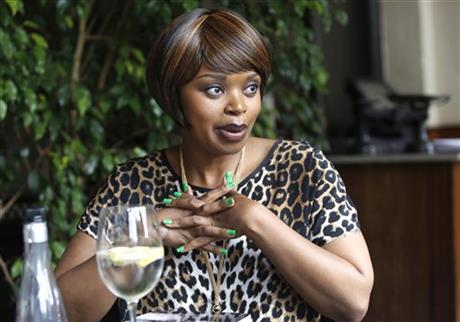
By CARLEY PETESCH
In this photo taken Thursday, Nov. 7, 2013, Zoleka Mandela, granddaughter of former president Nelson Mandela, is interviewed in Johannesburg ahead of the launch of her book “When Hope Whispers.” The 33-year-old launches a book in South Africa Tuesday, Nov. 12, 2013 “When Hope Whispers,” that recounts her family’s involvement in the fight against apartheid, her struggles with alcohol and drug addiction, the loss of two of her children and her fight against breast cancer. (AP Photo) SOUTH AFRICA OUT
JOHANNESBURG (AP) — Nelson Mandela’s family is no stranger to the public eye —its successes and trials have been aired for decades in films, books and the news media.
Granddaughter Zoleka Mandela’s story, perhaps, is the one that no one saw coming. The 33-year-old launched a book in South Africa Tuesday, “When Hope Whispers,” that recounts her family’s involvement in the fight against South Africa’s white minority regime, her struggles with alcohol and drug addiction, the loss of two of her children and her fight against breast cancer.
The book’s publication comes as Nelson Mandela, 95, is in critical but stable condition, under intensive medical care at his Johannesburg home, after being discharged in September from a lengthy hospitalization.
“There’s a social responsibility, I can’t run away from, and instead I feel I embrace it,” Zoleka told The Associated Press about being a Mandela. “One of the things I learned so much about my grandparents is that you always have the power in you to make a difference in somebody else’s life despite your own challenges, and I think that’s what I’m trying to do.”
Through her detailed accounts, Zoleka said she hopes to inspire women going through chemotherapy, addicts looking for silver linings and parents struggling with the loss of their children.
Zoleka’s childhood was anything but ordinary.
“By the time I was born, on 9 April 1980, my mother (Zindzi Mandela) knew how to strip and assemble an AK-47 in exactly thirty-eight seconds. She was twenty years old, trained in guerrilla warfare and already a full-fledged member of Umkhonto we Sizwe (the armed wing of the African National Congress),” says the book’s opening line, describing her mother’s participation in violent struggle against apartheid.
Before she was a year old, her grandmother, Winnie Madikizela-Mandela, had already smuggled her into Robben Island prison so her grandfather could see her. Zoleka recounts a story told by her mother and grandmother of a time they said she helped her grandmother by hiding a hand grenade in her school bag, where police didn’t look, though she still saw her grandmother arrested.
Her childhood brashness turned to teen rebellion when she abused alcohol and drugs. She writes of hiding drugs in her bra, smoking marijuana, drinking too much alcohol, doing lines of cocaine daily and the relationships that fueled her drug use and the suicidal thoughts that haunted her.
The book reveals that Zoleka was hospitalized after a suicide attempt in June 2010 when her 13-year-old daughter Zenani died in a car crash on the way back from a concert that opened the World Cup soccer tournament.
“I hadn’t seen my daughter for 10 days before her passing, and I hadn’t because I chose to use drugs. That’s obviously a reminder that I chose my addiction over my kids and I have to live with that for the rest of my life,” she said with a heavy sigh, her large brown eyes cast downward.
“I’m sincerely hoping that it’s seen as a cautionary tale to a lot of other parents,” she said. “I got myself clean, but it doesn’t bring her back.”
She lost another child days after he was born prematurely in 2011. Zoleka has one son, Zwelami, 10.
Following successful rehab, Zoleka now glows in sobriety.
The book also recounts her battle with breast cancer — she had a bilateral mastectomy and underwent chemotherapy.
“For me, what hurt me the most was I was losing my breasts. And my breasts was my connection to my kids,” she said.
She finished her chemo early in 2013 and said she wrote the book and will release video journals to encourage cancer survivors.
“My childhood wasn’t normal, my childhood wasn’t sheltered,” she said. “I’ve had these challenges in my life, these unbearable circumstances that have happened in my life and I’m using my own life experience to help somebody else that is struggling on their journey.”



